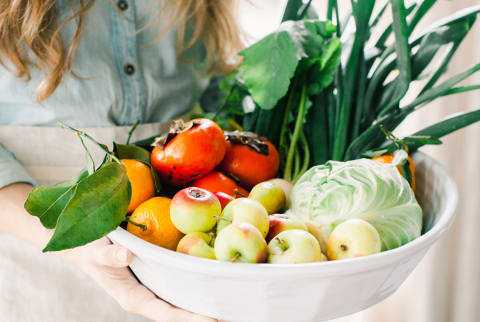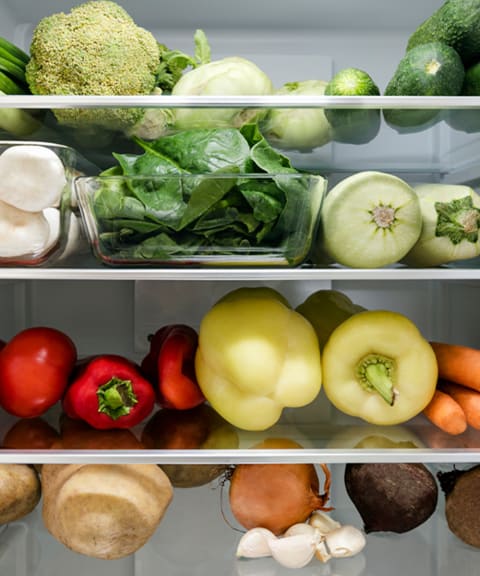Advertisement
The Power Of Plant-Based Cooking: What This Doctor Wants You To Know

If you're looking to improve your health, adding plants to your plate is one of the simplest and most delicious places to start. Research has shown that a plant-based diet is a cost-effective, low-risk way to stabilize blood pressure and cholesterol levels, prevent heart disease, and manage weight1. When you cook those plant-based mains or sides at home, you'll plus up those physical health benefits while giving yourself the gifts of fulfillment, creativity, connection, and joy.
We spoke with Scott Stoll, M.D., health and wellness adviser at Swich and parent company, Rouxbe, and co-founder of The Plantrician Project, to find out exactly how cooking plant-based can improve our lives. Plus, we got his advice on how to set ourselves up for success—from developing skills with a cooking community like Swich to stocking our pantry full of staples that will serve as inspiration and nourishment.
Let's get into it.
The connection between diet and disease prevention.
Make no mistake, the westernized dietary pattern (comprising more than 60% processed food and 25% industrialized animal products) is one of the greatest contributors to what Stoll describes as "a pandemic of diseases called noncommunicable diseases or diseases related to our diet and lifestyle choices."
He continues, "The CDC estimates that between 75 and 80% of the cost of health care ($3.7 trillion) is directly related to lifestyle diseases; the behavioral choices that people make every day, including the food on their fingers, forks, and plates; hours of sleep; activity levels; habits like smoking; and stress management."
Simply put, cooking at home can aid in preventing these lifestyle diseases. According to research2, people who cook and eat at home more frequently were more likely to adhere to healthy dietary patterns, eat more fruits and vegetables, have higher blood levels of vitamin C, and consume fewer calories (the average restaurant meal contains about 500 more calories than a home-cooked meal!).
Plus, you'll consume significantly less sodium, sugar, and calories and can avoid preservatives and other harmful chemicals like phthalates (a chemical derived from plastics) and MSG. In fact, research has shown3 that people who dined out had urinary levels of phthalates that were 35% higher than those who dined at home.
And remember—it's not about abandoning your favorite local restaurants or skipping social celebrations at restaurants forevermore; it's about cooking at home more often and adding more plants to your plate to support your health. An added benefit will be making those restaurant meals even more special (after all, they can be sources of inspiration for your at-home cooking projects).
Reframing convenience at mealtimes.
Life is busy. Between work, family, friends, and fitness, it's understandable that even the most health-conscious people can feel like cooking at home is too hard or time-consuming. But the truth is, once you have a few skills and some pantry staples, a delicious home-cooked plant-based meal is more convenient than that takeout—especially when you consider the longer-term effects.
Stoll puts it best: "Our industrialized food culture has shaped our ideas and perpetuated misconceptions around food preparation and the very idea of healthy food. Along the pathway of industrialization and 'time-saving' strategies, mealtime came to be viewed as a competitor of more 'valuable' uses of time. These unfounded beliefs evolved through repetition, convenient products like frozen microwaveable dinners and groupthink, to ultimately disconnect people from the richness of the homemade meal that can be shared with family and friends."
"Culturally, we believe we are too busy to prepare food at home, and yet the average adult today spends at least 3.5 hours on social media and their phone." If that doesn't put things in perspective for you, think a little longer term. As Stoll explains, "The perceived reward of less work, less hassle appears to be true because of the time savings and workload when you are tired. But it's a false reward cycle because the food away from home can contribute to poor health, mood alterations, increased susceptibility to chronic disease, inflammation, and increased pain and weight gain."
So, if the convenience myth is stopping you from cooking at home, it's time to change your mindset. Start by learning some cooking skills—that initial investment of time will pay off when you are able to whip up weekday meals in a flash and turn your weekend family time into creative cooking projects. Swich is the perfect place to start because it recommends personalized learning and cooking content for each person based on their health goals, current skill level, and favorite food and flavor profiles. They also offer an array of short, fun instructional technique videos that are specifically designed to help users develop specific cooking skills (like stir-frying or roasting vegetables), giving you a source of motivation and a sense of community when it comes to your plant-based cooking journey.
Setting up your kitchen for success.

Stocking a pantry and fridge full of plant-based staples is about more than just having what you need on hand. When you open up your fridge and see the colors of the rainbow or you cook up a batch of beans while you get through meetings at home, inspiration is at an all-time high, and creating an evening meal is both joyful and simple.
When cooking at home, Stoll says, "I like to think of a core of basic ingredients that can be adjusted to your flavor preferences. The core of a quick basic meal, and still something we use in our home multiple times every week, would be beans/lentils, a whole grain like quinoa or millet, greens and veggies that can be flavored with any number of herbs and spices to create either Thai, Mexican, Italian, Middle Eastern, Americana, Cuban, etc. These can be prepared in advance through batch cooking and combined quickly to make a bowl, soup, stew, casserole or bowl."
Take inspiration from this list of multipurpose and nutrient-rich foods that Stoll always has at home—together, they can build a huge variety of meals, depending on what you're craving:
- Dry and canned beans and lentils
- A variety of dry whole grains like quinoa and rice
- Green veggies like kale and collards
- Cruciferous veggies like broccoli, cauliflower, and Brussels sprouts
- Other veggies like cucumbers, carrots, and celery
- Berries (both fresh and frozen)
- Other fruits depending on what's in season
- Dried herbs and spices
- Raw seeds and nuts like hemp, sunflower, walnuts, and cashews
Gratitude, community, and connection in cooking.
Saving money, improving your health, and having a creative outlet are all just some of the many benefits of cooking at home. But the most important benefits are a little deeper.
"The process of handling and preparing our food connects us in a more meaningful way to the wonder of food and the linkages that brought that food to our plates. It can inspire gratitude for the ecosystem of food production and move us from a consumer mindset to one of participant and steward. In our home, we often take time to gratefully consider the people and processes that grew, harvested, transported, distributed, and prepared our food," Stoll shares.
Speaking of connection, the process of cooking can help us form stronger bonds with the people we are closest to. "The beautiful process of cooking a delicious healthy meal at home and sharing it with someone can affect the relationship that we have with ourselves and others. In this way, cooking and mealtime create a unique social setting that cultivates meaningful relationships through conversation, connection, and laughter."
The final word.
No matter where you are on your journey, the goal should be addition, not subtraction. Aim to add more plants to your plate, cook at home a little more, learn new skills, and add new, interesting, delicious dishes to your repertoire. This is the beauty of Swich; it's a free, invite-only online community that meets you where you are. It's fun, creative, straightforward, and will allow you to cook intuitively. Swich is offering mbg readers access to the free, invite-only program. Just use the code EATPLANTS to secure your membership.

Why Nutrition Is Key To Changing Your Relationship With Alcohol
Brooke Scheller, DCN, CNS

Why Alcohol Sabotages Your Gut Health & How To Get Back On Track
Brooke Scheller, DCN, CNS

Why Nutrition Is Key To Changing Your Relationship With Alcohol
Brooke Scheller, DCN, CNS

Why Alcohol Sabotages Your Gut Health & How To Get Back On Track
Brooke Scheller, DCN, CNS

Why Nutrition Is Key To Changing Your Relationship With Alcohol
Brooke Scheller, DCN, CNS

Why Alcohol Sabotages Your Gut Health & How To Get Back On Track
Brooke Scheller, DCN, CNS

Why Nutrition Is Key To Changing Your Relationship With Alcohol
Brooke Scheller, DCN, CNS

Why Alcohol Sabotages Your Gut Health & How To Get Back On Track
Brooke Scheller, DCN, CNS















